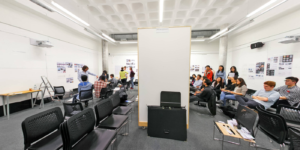How you'll learn
Year one of the programme comprises a series of interconnected modules, which are designed to lay the foundation for future years. The initial aim is to teach basic graphic communication and to give you the tools to develop your own design agenda.
Year two modules put increased emphasis on the context of architecture such as urban design, responsibility to society, and relationships with the construction industry.
The final year of the programme provides an opportunity for you to demonstrate you have acquired the necessary knowledge and skill to embark on a professional career in architecture. Building on the expertise and understanding of the previous two years, the design modules allow you to develop the necessary skills to design medium and large-scale buildings with a high degree of complexity.
How you're assessed
Written exams count for roughly 25% of your overall marks, with the balance coming from the creativity, reasoning and imagination you’ve shown in your work during the programme. In the studio modules, assessment is always carried out by a team of staff, who review all of the designs to arrive at a consensus on marks.
At the end of each academic year, portfolios of designs are reviewed by all architectural staff to reach a further consensus understanding of each student’s progress. We believe that excellent design is encouraged as much by what we teach, as by how far the student is prepared to pursue their architectural ideas.
We avoid a box-ticking approach to marking, looking instead for exploration and consistency in the design that demonstrates independence and invention. Our approach to marking by consensus gives, we believe, the best guarantee of fairness while encouraging personal experiment. The best coursework shows an awareness of the greater world of architecture and the building industry, and contributes to knowledge. We try hard to avoid templates of performance while keeping within best practice. To this end, guidance issued is as clear and precise as we can make it, whilst expecting that creativity will dominate.
Liverpool Hallmarks
We have a distinctive approach to education, the Liverpool Curriculum Framework, which focuses on research-connected teaching, active learning, and authentic assessment to ensure our students graduate as digitally fluent and confident global citizens.
The Liverpool Curriculum framework sets out our distinctive approach to education. Our teaching staff support our students to develop academic knowledge, skills, and understanding alongside our graduate attributes:
- Digital fluency
- Confidence
- Global citizenship
Our curriculum is characterised by the three Liverpool Hallmarks:
- Research-connected teaching
- Active learning
- Authentic assessment
All this is underpinned by our core value of inclusivity and commitment to providing a curriculum that is accessible to all students.









